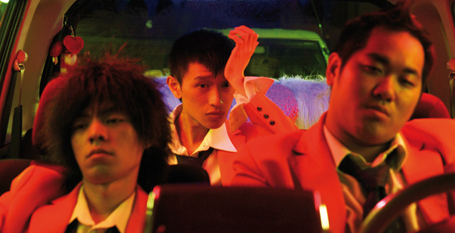
Kudos to the film's executive producer is German Wunderkind Wim Wenders, who has himself immortalized Berlin in Wings of Desire and Wuppertal in Alice in the Cities. Perhaps in Arvin Chen's script, he found a kindred spirit similar in the passion that he has developed for the life and soul of a city, and those that inhabit its labyrinth with their hopes and dreams.
So here is Taipei, Taiwan in the early 21st century. Kao (Jacky Yao) is a dreamy guy who helps his parents run their food stall and makes trips to the bookstore where he reads from a French instruction book, while his girlfriend is in Paris. Kao moons after bookstore assistant Susie (Amber Kuo) in the meantime even as he awaits reunion with his girlfriend. Brother Leopard (80s pop idol Frankie Gao) is a mob boss long having laundered his money into real estate and plans to retire somewhere in Hainan with a good woman. His nephew, Ah Hong (Lawrence Ko) is wannabe criminal mastermind who seriously misunderestimates his own intelligence as he does small rackets like rob convenience stores with his brood of orange-uniformed underlings. These are a bunch of Reservoir Dopes. One day, Brother Leopard wants Kao to retrieve some loot that's been hidden in a temple by a fellow hood on the run from the cops in exchange for airfare to France. Kao sets off with the motorcycle skills of his friend, a seemingly slow-witted and gawky convenience store worker. This begins a long night of mishaps for Kao as Ah Hong homes in on the loot for a big score, the convenience store worker is taken hostage, and the cops, consisting of a dashing wannabe supercop and his corpulent and dimwitted partner, all become a party to a mad series of capers.
With its underworld evocations and tone, Au Revoir, Taipei resembles a film Scorsese might have made if the moon hit his eye like a big pizza pie. In place of Scorsese's usual dark cynicism and biting humour, Au Revoir, Taipei offers moon-eyed romanticism punctuated by a refreshing though occasionally intrusive jazz and violins score. Through the eyes of writer director Chen, Taipei after dark is seen as a wonderland in which a group of senior citizens materializing in a park doing Lindy Hop have all the haloed sanctity and mystery of a choir of angels. It in this dark wonderland that the dreams of small folk float through the nightscape as disembodied souls, looking perhaps for their place to materialize. Before the morning comes happenstance and human frailty will either have sent those dreams packing with the first rays of morning, or allow those who seek to actually find what they need.

